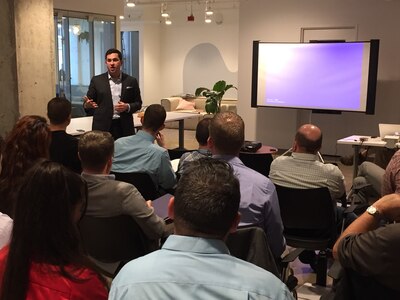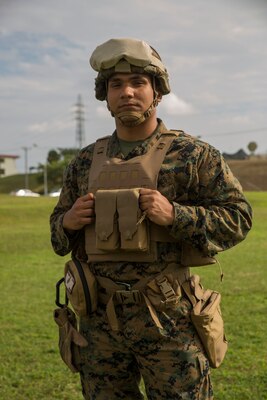By Lisa Ferdinando DoD News, Defense Media Activity
WASHINGTON, Jan. 15, 2018 — Forty innovative thinkers from
the four military services gathered here last week for a class where they
tested out new methods to solve problems in the Defense Department.
Joshua Marcuse, executive director of the Defense Innovation
Board, acknowledged the participants likely would encounter resistance in DoD
when trying to solve problems with new approaches. His message to them: Keep
fighting.
"When you hit that barrier, I want you to figure out a
way to push forward," Marcuse said Jan. 12, closing out the weeklong
class. "When the going gets tough, you need to hang in there."
The military and civilian personnel in the DoD pilot of the
Innovation Corps boot camp learned about and applied the Lean Startup
principles, which aim to solve problems and develop products faster and with
less waste.
New Approach to Problem Solving
The class was the first time the boot camp was held for
DoD-wide participants, Marcuse pointed out. Previous efforts encompassed the
intelligence community.
It is critical that leaders are receptive to new approaches
to problem solving, he said. Otherwise, innovative thinkers who continually
face opposition might stop trying to be change agents, resigning instead to be
a “cog in the machine,” he said.
Another scenario, he explained, is that these thinkers might
“fight the fight a different way,” taking their ideas and talents into the
private sector.
"But they're not fighting shoulder to shoulder with you
in your trench at that point, or in your foxhole -- and we need them in the
foxhole next to you,” Marcuse said.
Importance of Operating with Agility
The Defense Department has proven it can be highly
innovative and operate with extreme agility, as it has done in the battlefields
in Iraq and Afghanistan, Steve Blank, the founding father of the principles for
Lean Startup, said via phone today to DoD News. But, he added, resistance in
innovation is encountered back home, as the DoD execution machinery and
bureaucracy “crushes whatever we did in the field.”
Blank underscored the importance of agility and innovation
in the Defense Department as the United States faces near-peer state
adversaries and a host of evolving nonstate threats.
In recent decades, he said, the United States essentially
faced a single threat – the Soviet Union – and built organizations, structures
and capabilities to counter it with the luxury of being able to respond over
the course of years.
"Fast forward to
today -- we don't have one threat,” he said. “We need, in fact, a scorecard to
figure out who we're dealing with.".
Today’s adversaries are “ironically not burdened with our 100
years of success," or with all the things DoD needs to support, such as
contracting, procedures and other bureaucratic matters, Blank said.
The goal of the Innovation Corps and its methodologies is
see how innovation and delivering solutions can be done at speed -- not just
from idea to demonstration, but also from idea to deployment, he said. He
recommends that each DoD and intelligence community agency establish an
organization that has an innovation pipeline.
‘Eye-Opening’ Experience
Marine Corps Capt. Chris Wood, from Headquarters Marine
Corps Installations and Logistics, is an innovation lead in the next-generation
logistics innovation team. As a participant in the Innovation Corps boot camp,
he said, he found it interesting to see the collaboration among the personnel
from the different commands, including those with various levels of experience
in these techniques. Tasks included conducting in-person interviews, examining
the needs of the customer base, and testing a hypothesis on how to apply solutions
to problem solving.
“To see them receive the training and really embrace it was
eye-opening for me in that it starts to build a realization that these tools
can be applied to a lot of different functions," he said.
With the world outside DoD constantly evolving, Wood said,
the department needs to be agile to best respond to the threats and meet the
demands of the warfighter.
"We cannot accept doing business the same way that we
have been,” he added.
Recommendations from Defense Innovation Board
The Defense Innovation Board meets Jan. 17. The 14-member
panel will include in its recommendations that DoD examine whether career
avenues exist in the agency for innovative thinkers who want to apply new
approaches and methods to problem solving, Marcuse said.
Board member and retired Navy Adm. William H. McRaven,
chancellor of the University of Texas System, said he never encountered
innovation in a structured fashion in his nearly four decades in the military.
“We did innovation via technology, but it was more about
finding ‘things’ that solved a certain tactical problem,” he said in a written
statement, noting a process or intellectual framework to help shape thinking
did not exist in the military when he served.
“Efforts to build innovation capacity in the DoD workforce
are essential to renewing our competitive advantage on the battlefield,"
McRaven noted.









